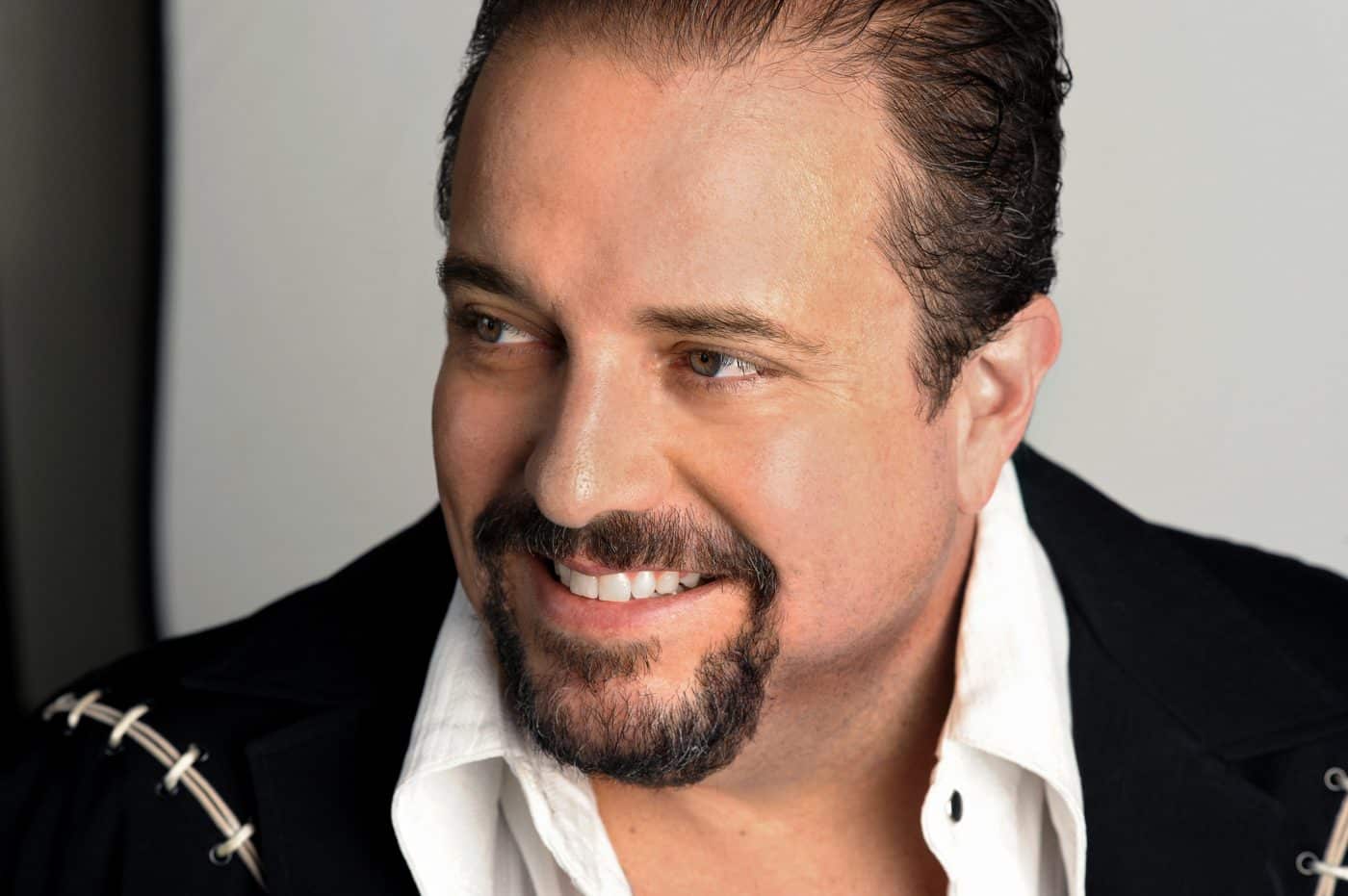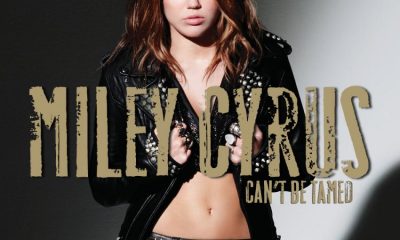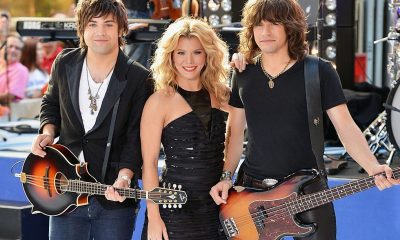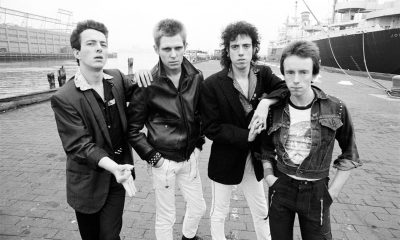Interviews
Raul Malo: A Lucky One
“Modern country music has become like McDonald’s. Yeah, over a billion served. But is it the best cheeseburger?”

There aren’t many Miami-born-and-raised Cuban country music singers. In fact, if Raul Malo isn’t the only one, he surely is the most renowned. As lead singer of The Mavericks, Malo was a regular presence on country radio in the 90s, charting six singles in the Top 40. The Mavericks also placed three albums in the Top 10, including 1994′s Platinum-selling What A Crying Shame.
The success of the Mavericks was something of a mystery even as it was happening–with a sound that borrowed from various musical traditions, songs like “O What A Thrill” and “All You Ever Do Is Bring Me Down” (which features a trademark accordion track performed by Flaco Jiménez) remains some of the most progressive country music ever embraced by the mainstream.
Laced with Americana undertones, the music of the Mavericks provided a perfect segue into Malo’s work as a solo artist, an eclectic exploration of musical styles that completely defies classification.
Malo spoke with The 9513 prior to his recent European tour.
JIM MALEC: You’re headed out to Europe tomorrow. What does your agenda look like?
RAUL MALO: I’m headed out to Belfast for a couple of days—there’s a songwriter’s festival—and then I head on over to London to do a bunch of press, radio, TV, that kind of stuff.
JM: You had some success in Europe with Trampoline, one of your later albums with the Mavericks.
RM: Yeah, absolutely. It started with Music For All Occassions and then it really went crazy when Trampoline came out. “Dance The Night Away” was a huge hit over there.
JM: So when you go play a show in Belfast or London, are they going to see you as the guy from the Mavericks, or as the world-class singer/solo artist you are now?
RM: Even though you don’t have all the mainstream success you were getting when your song was on the radio, you still get legions of fans that come out to your shows. So you can go and perform and not really have to play your hits. And that probably holds true for me just about everywhere. People don’t come out to my shows expecting me to play Mavericks songs.
JM: Your music is generally—and I use the term loosely—classified as Americana. In terms of the European connection, how does that translate? And in a broader sense, how do you feel about that term? Because your music is hard to classify. You’re a tough guy to pin down.
RM: Yes. On that note I agree. You know, I’m a fan of the Americana format in that it allows artists like me to have a home. I certainly proudly stretch the limits of the definition of Americana, but that’s OK. We gotta put me somewhere, so it might as well be Americana. That’s about as fair an assessment as you can get. I do realize that it’s difficult to categorize what I do. And that’s fine, I don’t mind being the odd man out. I’ve kinda made a living at it, really. I’ve survived by carving out my own little place. And it’s ok. There’s nothing I can do about it. I come by it honestly. I do what I do because I want to do it this way, and I make the music I make because I don’t know what else to do.
JM: Ultimately, we can’t say that your music is definitively this or that. But when you look at its evolutionary stem—where it springs from—would you say that it comes from a country tradition? Does it come from a pop tradition? Your new CD, Lucky One has some Spanish influence and some big band influence. Where does your music begin, and how does it get from that point to where it is now?
RM: I honestly don’t think about this much, although I have lately because I get asked this quite often. I think part of it is because of how we are as a people. Whenever anybody goes to see a movie, they go, “Well, what was it like?” And someone will say, “It was kinda like Spider-Man meets this,” or whatever. We have to use something else as a reference point, because that’s how we describe things.
But I’ve been forced to think a lot about this lately. And it is a good question. And really, the most honest answer I can come up with is that I think you need to look at where I grew up and at how I grew up. I grew up listening to all kinds of music. I really did. I know that people say that all the time, but I grew up in a place—Miami, Florida—which was not exactly a haven for country music, or a haven for this or that. Yet the music was so varied down there. I remember driving around with my Granddad listening to AM radio, and on that station we would hear Englebert Humperdink, we would hear the Beatles, and then every once in a while we’d hear a country song. I remember hearing “Rose Garden.” I remember Buck Owens.
And I also remember Hee Haw on Saturday night. That’s really how I got into country music. ‘Cause every Saturday night I would watch Hee Haw—and this is no lie—followed by the Lawrence Welk show. And not because I thought they were the grooviest shows on the planet or anything like that. I knew, even back then, how corny they were. But the musicianship was great. And the music was great. Hee Haw would have great artists. I would get to see Loretta Lynn and Conway Twitty and Buck himself. And every once in a while a rock star would be on there.
And I remember the Johnny Cash show. I saw Bob Dylan for the first time on that show. And growing up in Miami, with basically no music business around, and really nobody to tell me what genre this was or that was—I just grew up loving all of it. And then you mix in the whole Cuban culture, because there was plenty of Cuban music around. My Granddad was always singing. There was always a party where there was music. And then you had all the Latin jazz that was just naturally evolving in the Miami scene. Then there was all the reggae and calypso stuff from the islands. You had this huge mix of music, and I loved it all. I really did. I enjoyed all of it. Including opera. My mom was a big opera fan.
So, in answer to your question, I think part of it is because I grew up listening without prejudice. I loved it all. I took bits and pieces of all the music that I loved, and somehow they manifest themselves in the music I write and in what I do. And I don’t really worry about it or think about it.
And now that I don’t have the restrictions of a country music band or any of the expectations that come with it, I really feel like I can do whatever the heck I want. And so it’s been great fun the last couple of years.
JM: Let’s talk about the restrictions of being in a country music band. I think the Mavericks hold an interesting place in country music history. They are sort of an aberration in the pattern, partially because many of those influences you just cited manifested themselves, at least in some small way, even in your music back then. But I’m curious—how do you get from that very eclectic musical environment of Miami to a major label deal on MCA Records with a band that is making a play at mainstream country radio? How do you get from A to B?
RM: You know, that’s probably better asked of someone else. We were just a band down there. We were this sort of pseudo-country rock band, and we didn’t really know what we were doing. But we knew we were doing something right because the places were packed. People were coming to see us left and right. Everywhere we went the places were sold out. Eventually Nashville came calling, I think, because they genuinely liked us but also because they saw a good business opportunity. Let’s be honest about that, because there are plenty of artists that Nashville likes but doesn’t support.
Back then, the economy and the situation of the record labels was so good, and they were so healthy financially, that they could take a chance on a band like the Mavericks. That was, in and of itself, a very risky move. I mean, here’s this strange band out of Miami that’s really blurring the lines between rock and country and God knows what else, with a Cuban lead singer. It was the economics of the time, for sure, but also I’m convinced that they genuinely liked us. And we did really well with MCA for those years.
JM: And of course later you would come out with “All You Ever Do Is Bring Me Down,” which featured that great accordion track. It’s bizarre to think about that song in the context of today’s county radio. Given your perspective, what has changed in the music industry since you started with MCA? It seems like artistry has become very narrow and that there aren’t many artists who are finding commercial success while still pushing boundaries and being inventive. I can’t imagine an act coming out with “O What a Thrill” today and expecting, with any reasonable level of confidence, to get spins on radio. Why do you think that is?
RM: Now more than ever, record labels are more corporate and more tied and beholden to corporate strings. Budgets are tighter. And whenever that happens the music suffers. Right now everybody’s looking for the next Carrie Underwood. And that’s why radio all sounds the same—it’s all corporate. That’s really it.
I mean, that’s not to say that all of the music is corporate. There’s some good stuff out there right now. There are some good artists fighting the good fight. But they’re few and far between, and they certainly aren’t getting the recognition that they deserve.
Modern country music, to me, has become like McDonald’s. It’s like, yeah, over a billion served…but is it the best cheeseburger? I don’t really think so. But they sure have sold a lot of ‘em. And there’s a lot of it out there. It’s kinda like that—very mainstream and kinda bland, really. It’s vanilla flavored.
And it’s funny, because they talk about their numbers being down and about how they’re not selling any records, yet they keep putting out the same stuff over and over again. I don’t hear anything fresh or anything new. These corporate labels, I don’t think they know how to do anything anymore. I don’t think they know how to sell records anymore. There’s no records to be sold. They’ve just about ruined that.
If I were a new artist now, I don’t know that I’d go sign with a major label. I’m not gonna let them take my t-shirt money or my ticket sales. Uh-uh. No 360 deals. Don’t bring me into your pile of crap just ‘cause you can’t figure out how to sell records.
JM: You touched on this very briefly earlier, but I want you to talk about this in more detail. Creativley, did you feel held back as a member of the Mavericks?
RM: Oh yeah, absolutely. I mean, listen—we pushed it as far as we could take it. But even as far as we took it…here’s the thing. People forget this. When Trampoline came out the record label here had no idea what to do with it. They really didn’t. We weren’t getting any radio play. They were talking about how the Mavericks were done. But we thought we had a really cool record. We thought it was an interesting record. Well, luckily, we still had Europe. And, lo and behold, Europe latched on to Trampoline, and once it started getting radio play we started going over there quite a bit and really working that angle. Then, all of the sudden, we had the number one song in Europe. All of the sudden we were back in it. Except not here. Not with Nashville and not in the States. So we realized that if they didn’t want to do anything with it here, we could still get out and make a living.
And so that a was a big eye opener. It was a time when I realized what was going on here in the business.
JM: Your new record, Lucky One is fantastic. I got an early copy of it back in November and have been playing the crap out of it ever since. This is your first album of original material in quite a while, so I’m curious as to what kinds of things you were looking at when you started putting this project together. How did you pick songs? When you go so long without doing something like this, what is the process like?
RM: Well, you know, it’s funny. People forget that in between Today and Lucky Onethere was a Mavericks record. And the Mavericks record was all my songs, too. It just wasn’t called Raul Malo. So it’s not like I went eight years without an original music album. There was one in there, it was just by another name. And not to take away from what the band did, but those were all my songs.
Basically what I wanted on this record, like I want on any record, is to just put the best songs forward no matter what style. Unless it’s something that’s too extravagant or just too out there. But here’s the thing—I don’t think there’s anything too out there. We’ve sorta become so monophonic, where we expect one thing out of one artist and that’s what he needs to do for the rest of his life. I remember when I’d play a Beatles record or a Police record or a Prince record or whatever, there was varying degrees of difference between styles on each record and within each record. To me, you listen to Sgt. Pepper’s and you hear quite a variety of styles. Yet it was still within the realm of rock and roll. And nobody even though twice about it.
But I think as time has gone on we’ve become so used to putting things in a nice, neat little box that whenever somebody strays from it people get kinda freaked out a little bit. People meaning labels. And I think labels underestimate the sophistication of the real music fan. We have dumbed down music and culture to such a degree that we just really expect people to be idiots. And people are not idiots. That people are not buying records right now is no surprise.
I mean, for years producers have put songs that they owned publishing for on records. The label then charges $18.99 for the record. The producers are also paid by the labels. They also produce the record, which comes out of the artist’s pay. And they put songs on there that they own publishing on—and then they wonder why kids are downloading one song off the record. And then they go after them! The whole industry just has it wrong.
You wonder why you’re not selling reords? It’s because you people have just corporatized this thing to such an extent that you’ve ruined it.
I mean, I was just out at the Grammys, and none of the labels had parties after. That’s because they can’t even hold a party without going into debt. They don’t even know how to do that. I mean, come on. Give me a bucket of Coronas, an iPod and a hotel room. I’ll show you a damn party.
JM: I hope to be there for that one.
RM: You know what I mean? I don’t need any chocolate fountains or any ice sculptures or any of that crap.
JM: Since you mentioned the sensibilities of the contemporary music fan, I want to get your opinion about something. Now, you’re a guy who has been highlypraised for your singing. You’ve been called one of the best baritones in the world. You’re widely considered one of the truly great singers of our time. And that makes you an interesting case in today’s society, because we have been so heavily influenced by the American Idol/Guitar Hero revolution, which has produced a core of entertainers who don’t seem extraordinarily talented. Now, in the past we could look at so-called “bubblegum pop” acts and say that, while their music may have lacked substance, they at least met a certain threshold for technical proficiency. At least they were better singers than Joey and Jill down at the local karaoke bar. Do we expect less from our entertainers than we used to?
RM: No, I think all that is a cultural phenomenon. Not even a phenomenon, it’s just the trend.
What’s happening is you’ve got a whole slew of the population that is really disgusted by popular culture in general. Those are the people who are gonna come out and hear me sing. Those are the people who are gonna go out to a Lucinda Williams show. Those are the people who are gonna go out and hear Shelby Lynne perform. Those are the people who are gonna buy those records.
And yeah, you know, they’re not hit records by the standards that record labels have put forth. But the smart artists, the ones that can actually go out and perform, the ones that can actually stand in front of an audience and sing and play, those are the ones that are gonna make it through all of this in the end. People want to be entertained. People want real entertainment. I mean, I thought it was fitting that on the Grammys, I watched the show and I didn’t get half of it, if not more. And I’m not the only one. It was just so funny that they had the best reactions of the night for the over-60 performers. Al Green, Paul McCartney and then finally Neil Diamond. I mean, when Neil Diamond sang “Sweet Caroline,” everybody was on their feet singing along. And it’s like, here you go, here are the Grammys, a show that’s supposed to be showcasing new talent and new stuff and new records, and who do they get to liven the place up? The 66 year-old Jewish boy from Brooklyn singin’ his 40-somethin’ year-old hit.
JM: But doesn’t that contradict what you were saying before about how major labels and “hits” are passé? I mean, everyone is singing along to “Sweet Caroline” because at some point along the way the label was able to transform it into this pervasive hit that everyone is familiar with. It’s a song that kids know and that their parents know. That’s a hit by every definition. If we decentralize our music and everyone starts listening to only music that falls within a specific niche, do we any longer have those kind of socially unifying songs?
RM: Well, go back to the song. “Sweet Caroline,” I mean, that’s a pop hit. That is an undeniable pop hit.
Here’s an experiment for you if you wanna try this out just for fun one day. If you have satellite radio, put on the 40s station and see how long you can go listening to that. You need a road trip for this. Then, after a while, click on over to the 50s, and see how long you can go on that. Then click on over to the 60s—same thing, you could pretty much go all night listening to the 60s without ever having to change the channel. Click on over to the 70s, and you could pretty much go all night listening to that with an exception here and there. And then you start getting to the 80s. And then with the exception of a Prince or a U2 or a Police thing that was just exceptional, there really isn’t much. And then the 90s? Forget it. You wanna drive your car off the road. And as far as modern country music? Forget it. I can’t even listen to that. I can’t even listen to modern country radio. And it’s like “Where did we go wrong?” I don’t listen to the 40s station because it’s a nostalgia trip for me. I wasn’t around. It’s not like I grew up missing the big band era. I’m not that old. I don’t remember the days of going to see Duke Ellington in a club. I wish! I’d kill to go see Duke Ellington at a club. Now we’re lucky to get a shitty karaoke bar.
You can just tie it in to the corporate takeover of the music business. And it’s right around that time, in the late 70s and early 80s. When Columbia became Sony. When Warner Bros. became Time Warner. All of that changed the music business forever. It made it invariably worse. The music suffered. Everything suffered. And now here we are. They’ve been milking this thing for a while.
They’ve been spending so much. I can’t even tell you how many hundreds of thousands of dollars—millions of dollars—to run a song up the flagpole just so that it gets up to #1, but they’re not selling any records because nobody cares. The fans don’t care. Fans don’t care about a #1. A #1 is for people on Music Row to put up a banner outside their building and go “oh, well, we had a #1 this year.” That way they can go back to their board and say, “we did this, this and this.” But it’s all bullshit. It’s all Enron accounting. It’s all a house of cards. And now it’s about to come crumbling down.
But I’m optimistic. The artists that are gonna make it are the ones that can still go out and sing and play. And if you’re worried about the green M&Ms backstage you’re screwed. You know what I mean? If you’re not worried about that you’re gonna be fine. We all have to readjust our piece of the pie and we’ll be alright. The same goes with the music business. I mean, there is plenty of good music out there. Plenty of good artists. One of my favorites right now is Jamey Johnson. He’s as real as it gets. And I love his record. I just bought his record and it’s fantastic. So, there are moments of promise. And it’s gonna be people like that who will survive this whole mess that we’re in.
And believe me, I think it’s gonna get worse.
JM: It’s very heartening to see the success Jamey is having at Mercury. Going back to your new disc, since we got a bit sidetracked again, tell me about how Lucky One compares to your previous work.
RM: God forbid I give a clichéd answer, but this record feels like a continuation for me. There are a few surprises in there, I think, musically. But, overall, I think if people have liked some of the Mavericks stuff, if they’ve liked some of my solo stuff, I think they’re gonna like this record. I worked hard on this record, and wrote a lot of songs for it. I feel really good about it. Of course, I better feel good about it since it’s my record.
It just comes from having a lot of freedom. I realized a long time ago that I did not need a record label anymore. That happened when I booked a tour for my You’re Only Lonelyrecord. The company kept pushing back the release of the record, and we had this tour set up in support of it, and I thought, “Well, we’ll have to cancel the tour.” Well, we went to cancel the tour and, lo and behold, the tour was sold out. And that was just me and my guitar. So I thought, OK, worst case scenario, I can still go out and work with me and my guitar and really have nothing to do with what happens at the record label.
So the fact that now I have a label [Fantasy Records] that’s actually working for me, one that is, you know, actually putting my record out and promoting my stuff and is gonna help with the launch of this record and actually be in really good financial standing to help this record out…I’m happy as heck.
- Lists13 years ago
Top 10 Country Music Albums of 2010

 Interviews5 years ago
Interviews5 years agoJohn Rich – The Interview

 Song Reviews16 years ago
Song Reviews16 years agoTaylor Swift – “Love Story”

 Interviews5 years ago
Interviews5 years agoHoneyhoney on Hiatus: Revisit our 2008 Interview with Suzanne Santo

 Album Reviews14 years ago
Album Reviews14 years agoAlbum Review: Miley Cyrus – Can’t Be Tamed

 Song Reviews6 years ago
Song Reviews6 years agoThe Band Perry – “Hip To My Heart”

 Columns5 years ago
Columns5 years agoThe Link Between Folk Music’s Past and Present

 Columns5 years ago
Columns5 years agoIs Marketing Killing Rock and Roll?



